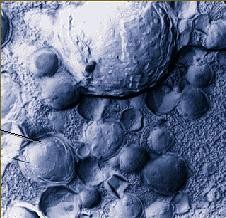Oct 23 2008
Vladimir Torchilin, Ph.D., professor and chair of the department of pharmaceutical sciences at Northeastern University's Bouvé College of Health Sciences, was recently awarded a 5-year, $1.54 million grant from the National Institutes of Health's (NIH) National Cancer Institute to investigate ways to increase the efficacy of nanocarrier-based pharmaceuticals for drug and gene therapy. Many pharmaceutical agents, such as drugs or DNA, need to enter the cell to carry out their therapeutic properties, and this study will address the challenges of getting these agents into the cell and reaching the target once inside.

Torchilin, the study's principal investigator, is the director of the Center for Pharmaceutical Biotechnology and Nanomedicine (CPBN). His research expertise is in the area of drug delivery systems using nanotechnology as a way to treat cancer and other diseases.
Nanomedicine, the medical application of nanotechnology, holds tremendous promise as a way to improve drug delivery systems. Pharmaceutical scientists are creating targeted drug delivery systems using nanoparticles that will allow the drugs or DNA to enter the cell and reach the intended target and exert their therapeutic function. The success of these agents once in the cell, however, is compromised because of cellular activities and functions, such as lysosomal degradation, which can alter the drug or the DNA and can make them ineffective.
The main objectives of this research project include developing the process of getting these pharmaceutical agents into the cell, identifying the target once inside the cell and protecting the integrity and activity of the drug or the DNA. Developing a platform for the creation of drug delivery systems capable of intracellular penetration, bypassing the cell wall and membrane, and targeting specific organelles, such as the mitochondria or lysosomes, will improve both the delivery of drugs and DNA and therapeutic outcomes for diseases such as cancer, lysosomal storage diseases, and diseases associated with genome dysfunctions.
“The ultimate goal of this research is to solve the extremely important and challenging problem of intracellular organelle-specific drug delivery, which will dramatically increase the efficacy of many therapies,” said Torchilin.
Targeted drug delivery systems include gene therapy, inserting new genes into a cell to replace mutated genes, and antisense therapy, where a gene known to cause a disease is “turned off.” For these systems, the genes are specifically targeted to carry out their therapeutic function in the nucleus, also located inside the cell. In addition, such delivery systems are suitable for anticancer pro-apoptotic drugs that target mitochondria, and lysosomal enzymes that need to reach the lysosomal compartment inside the cell.
The research team will prepare pharmaceutical nanocarriers, such as liposomes or micelles, that will envelope and protect the drug. They will also attach ligands to the outside of the nanocarrier that will assist in crossing the cell membrane and then binding to the target inside the cell. They will examine the interactions of these nanocarriers inside normal and cancer cells to see if they reach their target, such as nuclei or other intracellular organelles, and if they function correctly and improve the efficiency of the drug.
“We expect this research will lead to the development of a novel platform for targeted drug and gene delivery within cells and for provoking the effective apoptosis of cancer cells” added Torchilin. “Our hope is that this platform can be used to treat as many diseases as possible.”